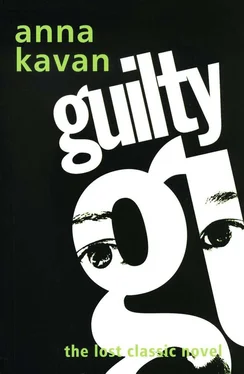‘You can’t buy our friendship by doing our work,’ they seemed to sneer, when, thanks to my help, they were able to rush away, leaving me alone in the deserted building. At times I thought I could actually see the contempt in their eyes when I handed over a pile of papers I’d dealt with for them, as much as to say, ‘The more fool you for having done it.’
Loneliness, no doubt, made me unduly conscious of their behaviour. It was my first term at school all over again. No one responded to my overtures; no one spoke a friendly word; though, among themselves, they talked and joked like any group of lively young fellows. Only I was simply left out of their conversation — out of everything — ignored, as if I’d committed a crime.
To withdraw into myself was the only possible course open to me, and after a time I ceased to approach them, working silently at my desk, almost as much alone in their midst as I was in my flat upstairs, where I sat for hours on end, dreaming, resorting once more to that other world which was so much more dependable than the real one. In my daydreams I was no longer a lonely, unhappy, insignificant clerk in a city office but the hero of some sombre and tragic story, triumphing over all obstacles.
But a fantasy life, no matter how vivid, can’t last all around the clock. During work hours I became like all the other insignificant, impecunious young men thronging the streets, the cafés, the restaurants; yet painfully aware that I was different from them, my singularity underlined every evening when they jammed the streets in home-going crowds, which gradually thinned until, when the places for eating and entertainment closed down, I was the only person left except for police and builders — in this area where private individuals were not allowed to have homes.
The jealousy and ill feeling of my colleagues became comprehensible when I got to know more about the frightful ordeal of finding somewhere to live, which played so prominent a part in their lives and from which Spector’s influence had saved me. I couldn’t possibly blame them for envying me my conveniently situated flat, when they had to travel long distances twice daily. How could they be expected to refrain from jealousy when I had two rooms all to myself — I, a mere schoolboy no one had ever heard of — while older and far more deserving people, some of them even actually famous, couldn’t find a corner to call their own?
To make matters worse, there was now one of those sudden incomprehensible changes of policy to which our rulers are prone: suddenly it was announced that no more large-scale building projects would be started and of those already under construction only such as were needed for official purposes would be finished, so that private people could look forward to no improvement at all in their position.
Instead of the busy anthill appearance the city had worn since my arrival, it now promptly took on a deserted air, as the cessation of the perpetual hammering left an uneasy hiatus in our ears, which the noise of traffic couldn’t entirely fill. This official policy of inaction, of course, had a bad effect on my own situation, as it did on public morale. I noticed an increased hostility in the office; as once before, I began to suspect sudden silences when I came in; my help was only accepted mistrustfully and with reluctance; and I became quite miserable, once more convinced that I was an outcast, hated by everybody. Above all, I was distressed by thinking Spector, too, must dislike me, otherwise he would never have placed me in this invidious position; and I went so far as to see, in the coldness with which I was treated, a projection of his own animosity. My attic home, once a source of such pleasure, turned into a burden — a handicap I’d have gladly exchanged for a little kindness. And now, just when I felt most wretched, the world of imagination, too, failed me as a way of escape, for I carried about with me always the tension accumulated in the office, which I was quite unable to shake off.
I remember an especially harassing day, when a rumour was circulating to the effect that the authorities had stopped building operations because a new catastrophe was known to be imminent. Looking at the resigned, despondent faces around me, I thought of my father’s belief that, to a sane, healthy mind, war was an evil within man’s power to avert, not the inevitable accompaniment of progress it was now supposed to be. Applying this, as I did every thought, to my own problems, I reflected upon the impossibility of normal thinking, when one was denied (like the majority of the population) the first essential of civilized life — the secure private retreat called a home of one’s own. No wonder the housing question had acquired its almost metaphysical aura, when it dominated and distorted people’s lives and thoughts.
Gradually my ruminations had been infiltrated by awareness of something which now interrupted them altogether: a peculiarly oppressive silence had fallen upon the office. Looking up quickly, I saw that all the others had stopped working and were looking at me in silence. I was quite used to their surreptitious glances; but this open concerted stare was something new; and I noticed that, as if by some sinister prearrangement, each face wore the same accusing look. My nerves had been on edge so long that I couldn’t bear my colleagues’ wordless arraignment. Feeling I must get out of the room, I tried to stand up; but, with an elusive sense of recollection, as if I were re-enacting a scene already familiar, I found that I couldn’t move. It was the others who rose and silently filed out, leaving me there alone and confused.
Collecting myself with a great effort, I glanced at my watch, for no special reason except that it seemed an everyday commonplace act, and saw that it was midday — they’d merely gone out to lunch as they always did; their departure had no ominous secret significance.
At this moment one of them came in again, walking straight to his desk, which happened to be next to mine. He paid no attention to me but opened a drawer and searched in it, his head bent so that his face was hidden. I knew he was bound to look up in a second; though for the moment I couldn’t see his eyes, and the possibility of again meeting accusation in them was intolerable to me, the more so because I’d always liked the look of him better than any of them. His name was Link, and he alone seemed not to share the tough self-interest on which the others prided themselves. He was tall and thin, and his candid blue-eyed face had a look of integrity absent from theirs. I’d always been glad to have him as my neighbour, even though we rarely exchanged a word. Suddenly now I couldn’t bear to think that he shared the general suspicion and bad opinion of me and, on the spur of the moment, said, ‘I’ve decided to give up the flat. I shall tell Spector I can’t go on occupying two rooms while so many people are homeless.’
He looked at me in surprise. I felt better now I’d declared this sudden intention. I watched him slip some small object into his pocket and then straighten up, growing taller and taller, towering above me, and again an elusive memory was briefly invoked. I forgot about it when he said, ‘Spector might not like that’, adding quickly, ‘Aren’t you coming out to lunch?’ Obviously, he had found whatever he’d come back for; yet he still seemed in no hurry to go. I told him I would eat a sandwich at my desk as I always did, not mentioning that I didn’t like to emphasize my friendlessness by going out alone among the crowds at this time of day; at night, when fewer people were about, I felt less self-conscious. ‘That’s not enough. You must lunch with me one day soon. I’ll show you a good place quite near.’ He looked at me a moment longer with a slight frown, as though his good nature were struggling with a different feeling, then turned, and, suddenly in a hurry, went out of the room.
Читать дальше












